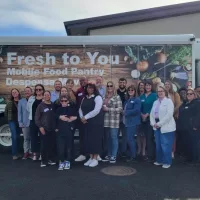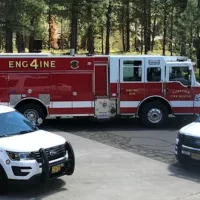
New data calculated this week by NeighborImpact reveals a record-breaking rise in demand for food across Central Oregon. In the most recent quarter, the organization’s Food Bank and its partners served an average of 83,000 individuals per month—the highest in its history. This equates to a 13.7 percent increase over the previous quarter’s 73,000 individuals served.
This surge in need comes as the food bank grapples with a 17 percent drop in federal food supply, the result of the U.S. Department of Agriculture (USDA) cutting commodity distribution. This freeze has already canceled orders through July, slashing a key supply of dairy, eggs, meat, and produce relied on by food banks, including NeighborImpact, across the country.
In response, members of Oregon’s congressional delegation have called on the USDA to reverse the freeze. A joint letter—signed by Congresswoman Janelle Bynum, Congresswomen Suzanne Bonamici, Val Hoyle, Maxine Dexter, and Andrea Salinas, as well as U.S. Senators Ron Wyden and Jeff Merkley—urges Secretary Brooke Rollins to immediately restore the flow of federal food assistance.
“We urge you to take immediate action to correct course and ensure that the communities we represent do not face heightened food insecurity because of your official actions,” the lawmakers wrote.
Congresswoman Janelle Bynum, who represents the Bend and Redmond areas in Congress, visited the regional Food Bank in Redmond last week. During her visit, Bynum met with food bank staff and community partners including The Father’s Group, Mosaic Community Health, Madras Community Food Pantry, Redmond City Council, and Latino Community Association and representatives from local food pantries, among others.
“We are grateful for Congresswoman Bynum’s advocacy and her commitment to standing with us in the effort to fight hunger and feed hope in Central Oregon,” said NeighborImpact Executive Director Scott Cooper. “As need continues to rise, so does the importance of this work—and the need for sustained support from federal partners.”
Congressman Cliff Bentz, who represents most of Central Oregon’s geography, did not join in the delegation letter, but his staff met with NeighborImpact representatives in March in Washington, D.C. and expressed concern for having an effective means of addressing hunger in the region.
NeighborImpact operates the regional food bank for Central Oregon, distributing over 6 million pounds of food through 57 partner agencies across Crook, Deschutes, and Jefferson counties, as well as at the Confederated Tribes of Warm Springs. The organization urges community members to take action as Central Oregon faces a deepening crisis in meeting food demand. To help meet the record demand, donations can be made at neighborimpact.org/donate. Every contribution helps provide critical food resources to individuals and families across the region.
However, donations alone cannot make up for the gap created by federal funding cuts. To continue meeting the need at scale, NeighborImpact—and food banks across Oregon—require restored support from the federal government. Constituents are encouraged to contact their elected representatives and demand immediate action to reinstate USDA funding for food assistance programs.
Cooper noted that while NeighborImpact is managing the current situation with reduced allocations of food to partners, he worries about just how deep the crisis could go. “If unemployment rises or if the cost of food rises more, due to tariffs or other economic policies or if rumored cuts of 30 percent to SNAP benefits are enacted or the enhancements to SNAP benefits implemented in 2021 are reversed, that would drive even more people into food banks,” he said. “The food supply doesn’t magically expand. What do we do then? Without federal partnership, we simply cannot keep pace with the growing need. We need both the compassion of our neighbors and the commitment of our leaders.”















